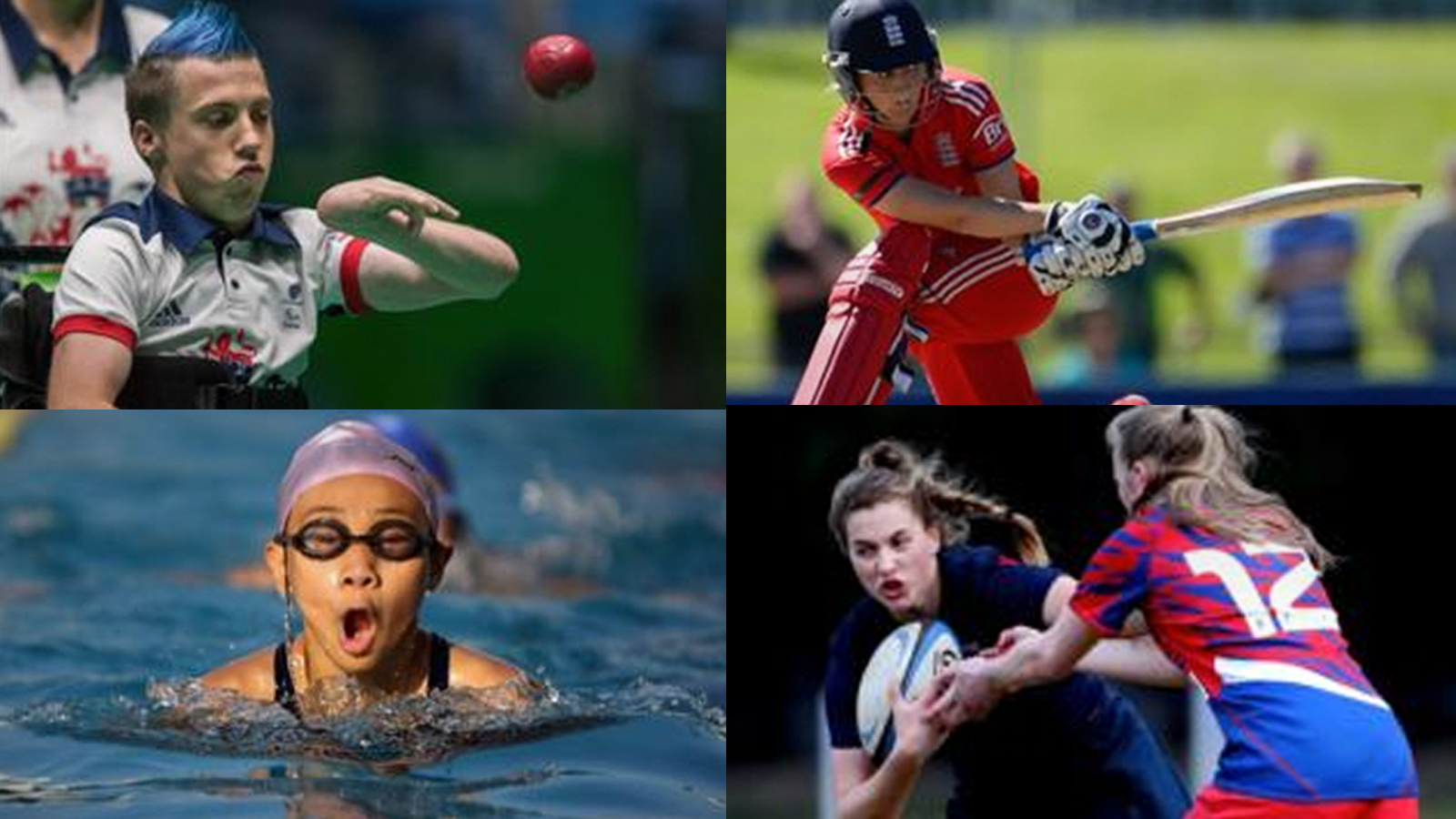Surfing: Olympics a perfect fit - Tatiana Weston-Webb
- Published
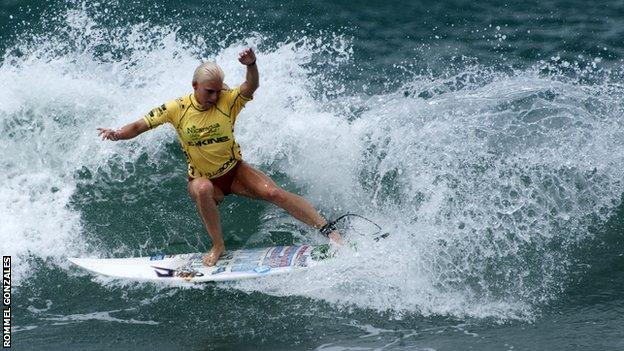
Surfing is one of five sports added for the 2020 Olympics in Tokyo
"Painting art on a surfboard."
Beautiful image, isn't it? It's the picture painted by top surfer Tatiana Weston-Webb while discussing her sport's inclusion in the Olympics.
Surfing will join four other additional sports - skateboarding, karate, sport climbing and the joint bids of baseball/softball - at the 2020 Games in Tokyo.
The move has been greeted with scepticism by some, questioning their right to be at the event alongside the likes of athletics and swimming, when sports like squash have missed out.
But here Weston-Webb, recent winner of surfing's US Open, tells us why she believes it is "the perfect fit" for the Olympics, how the sport is "in her veins" and opens up about life riding the waves.
Why does surfing deserve an Olympics spot?
When asked for one word to describe surfing becoming an Olympic sport, the effusive Weston-Webb pauses and thinks hard.
"Indescribable," says the 20-year-old from Hawaii.
It is more than a century since Duke Kahanamoku - considered the father of modern surfing - first expressed a wish to see the sport at the 1912 Olympic Games in Stockholm.
The debut 108 years later - part of a move to attract a younger audience to the Olympics - is described as a "game changer" by International Surfing Association president Fernando Aguerre, who has praised the "forward thinking" attitude of Games chiefs.
"We are especially excited for the athletes, including budding stars and current elite surfers who will have the chance to represent their nations and showcase their talents on the greatest sporting stage," he tells BBC Sport.
Weston-Webb aims to be one of them.
"Surfing should be included - we have worked hard and tried as a surfing community to elevate the sport. Now it's at a level it's never been before and would be a perfect fit to be at the Olympics.
"Surfing isn't really known too much around the world and it would expand our horizons.
"It's never happened before. Everyone is excited to see where this is going to take all of us.
"It would be the best to represent my country. I would be so honoured and privileged to be amongst the athletes that do compete at the Olympics. It would be a dream come true."

Know your surfing lingo

There is a range of scoring manoeuvres in surfing
Barrel - Much sought after. Where the wave is hollow when it is breaking. Sometimes called a "tube".
Fakie - Riding backwards on the surfboard, tail first.
Flat - No waves. A surfer's nightmare!
Froth - The foam left after a wave has broken.
Goofy - Surfing with your right foot forward.

So, what's the big deal about surfing?
"It's beautiful because it's one's way of, I guess, painting art on a surfboard and a wave," says Weston-Webb.
One person. One board. And the sea. The aim to impress judges with how you ride the waves.
Barrels, fakies, airs, talesides, 180s and 360s, you name it. There's a range of scoring manoeuvres, with points based on commitment, degree of difficulty, innovation, variety, speed, power and flow.
"It comes down to what nature provides us, how well we keep our strategies together and what kind of waves we catch. We want to perform for our viewers," says the surfer.
"Surfing appeals to a younger audience. On the women's side we are nearly all in our mid-20s. It's really refreshing and different as a sport. It's captivating."
It is hard not to be caught up in the enthusiasm. She says it releases "toxic energy" and leaves you feeling positive.
"The ocean is the most beautiful place and being able to catch a wave, do different manoeuvres and express your passion for me is the best thing in the world."

How will surfing work at the Olympics?
One idea, of having man-made waves which ensure consistent conditions for every surfer, seems unlikely to be realised.
"The IOC has already confirmed that the surfing competition will take place on natural ocean waves and we are very pleased with this decision," said Aguerre.
"Surfing is hugely popular in Japan and the country has hosted many national and international competitions in a number of beautiful surf spots.
"The precise set-up of the facilities at an Olympic surfing event will be defined with the organisers at an appropriate time."
He said organisers would look to create "an amazing beach party atmosphere providing unforgettable memories" for athletes, spectators, broadcasters and fans around the world".

Life on the water at up to 30mph

"On the women's side we are nearly all in our mid-20s," says Weston-Webb. "It's really refreshing and different as a sport."
Conditions can range from ankle-high to waves approaching 40ft high. Surfers can reach speeds of nearly 30mph.
"My ideal conditions would probably be 5ft to 6ft with barrels and a left-hander because I'm goofy, which means my right foot is in front of my back foot facing the waves," says Weston-Webb.
"There's a device some surfers use which you can stick on your board and measure how fast you go, your degree of turns and how high you have gone in the air.
"We have plenty of different manoeuvres in our repertoire, anything from a simple snap turn where you turn the nose of your board vertical and bring it down, to carves were you bring the nose of your board right round on the whitewash and redirect.
"I do high-performance surfing which ranges from waves 10ft and under. There's tonnes of buzz when the waves are going off. The electricity in the air when the waves are going off is unbeatable."
What's a surfer's schedule?
A professional surfer is likely to be out on the board for several hours most days of the week - possibly up to three sessions of two hours each.
Factor in gym time, yoga, stretching exercises, and it is a busy schedule.
"It's a time-involved sport and you need to dedicate yourself 100%," explains Weston-Webb.
"You have to have a love for it, be physically fit, with fast stretch movements, be balanced, and I guess the rest comes from within."
Surfing before she was born
Tatiana was a toddler when she first went out on a board, though technically she surfed before she was even born.
"My mother was a professional body boarder and she surfed with me in her stomach. I think when she was about five months pregnant was the last time she could go on the water. Surfing's in my veins.
"My dad brought me out on a long board when I was about two and I had my little floaties on my arms and that was the first time I'd ever surfed," she says.
"I got more into it when I was about eight years old because my brother Troy had started surfing so I followed in his footsteps and I fell in love with it."
When do you reach your peak?
"As far as women surfing goes, I think our peak is something like 25, 26. For men it's a bit older. I mean Mick Fanning and Kelly Slater are really old - I mean not really old (they are 35 and 44) - and they are performing amazingly to this day."
How do you get into surfing?
Pick somewhere warm so you don't have to start with a wetsuit.
"Where the water's clear and the sand's white, that's an ideal location to start surfing. Waist-high waves with a great surf instructor would be the way to go," says the US Open champion.
"Surfing is something that everyone should try. It's proven to help kids with cystic fibrosis to make them happier. Salt water is like a natural healing thing. It's an overall stress reliever to be in the water."
Getting the gear
A surfboard costs anywhere from £300 to £450, a wetsuit roughly £75-150, with a pair of fins around £60.
"Usually for a professional surfer, we have our own shaper who shapes our boards. It's better if you've had a relationship with the shaper your entire life. For me, my shaper is Tim Carroll and I have been with him I think for nine years now," explains Weston-Webb.
"It's been amazing to be part of his artwork and to ride his surfboards has been an honour.
"Usually it's polyester and you have a foam polyester board with one or two coats of glassing. I customise it with colours and stickers, and all my sponsors.
"You have a different shape and size for every wave you go to so it's more complicated than it sounds. It's definitely an important piece of equipment."
And finally - imagine winning a medal at the 2020 Olympics…
With several leading golfers and tennis players missing from the 2016 Olympics in Rio, often citing fears about the Zika virus, critics say the Olympics is not considered the pinnacle of their sport.
There would appear to be few such worries in surfing.
"I would be more than ecstatic to be up on the podium with a gold medal or silver or bronze," says Weston-Webb.
"It would definitely be a huge check off my lifelong list of activities to do.
"I'd love to meet (swimmer) Michael Phelps, some of the ice skaters, the gymnast Gabby Douglas is a huge inspiration to me. There's too many to name."
Interested in surfing? Ride the wave of popularity with Get Inspired's guide to Adventure Watersports.
- Published1 December 2016
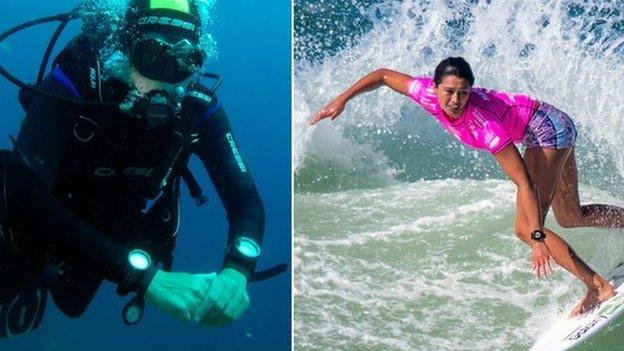
- Published4 January 2019
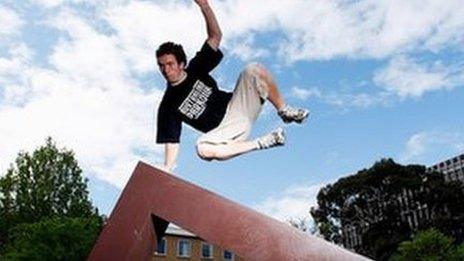
- Published30 September 2015
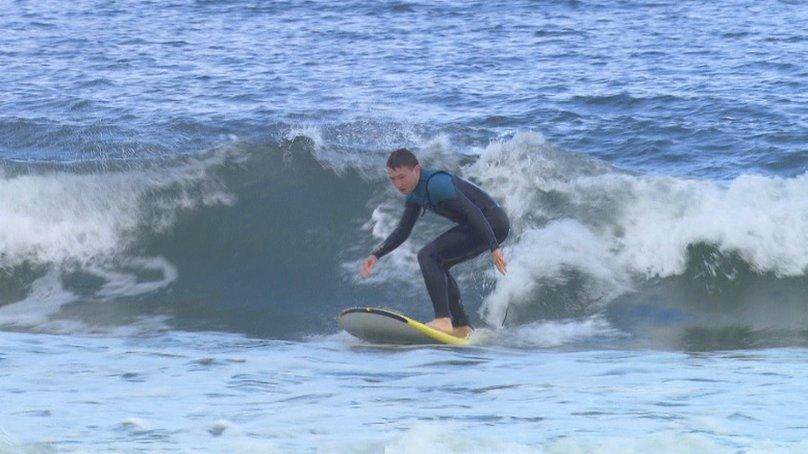
- Published13 August 2018
